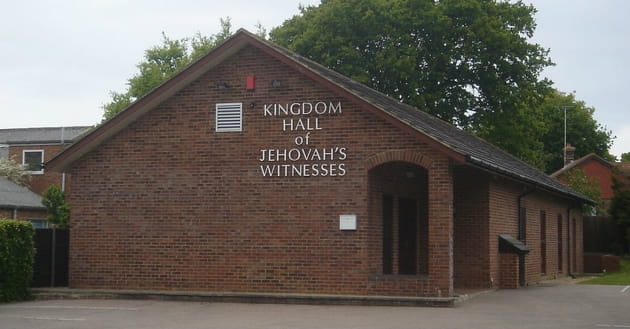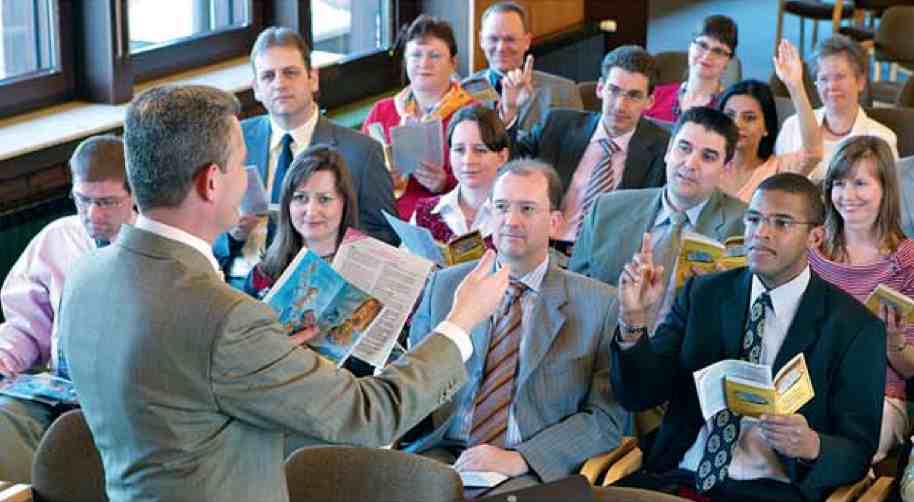Jehovah’s Witnesses is a millenarian restorationist Christian denomination with nontrinitarian beliefs distinct from mainstream Christianity. The group reports a worldwide membership of approximately 8.58 million adherents involved in evangelism and an annual Memorial attendance of over 20 million. Jehovah’s Witnesses are directed by the Governing Body of Jehovah’s Witnesses, a group of elders in Warwick, New York, which establishes all doctrines based on its interpretations of the Bible.
Below Are 15 Fact You Need To Know About The Jehovah’s Witnesses

1. When Was Jehovah’s Witness Founded?
Jehovah’s Witness was Founded in 1870.
Jehovah’s Witnesses originated in Pittsburg, Pennsylvania, when a Christian Restorationist minister, a man named Charles Taze Russell started leading Bible studies. Bible Student missionaries were later sent to England in 1881 and the first overseas branch was opened in London in 1900.
2. What Are The Basic Beliefs Of Jehovah’s Witnesses?
(What Do Jehovah’s Witnesses Believe?)
Jehovah’s Witnesses believe God is the Creator and Supreme Being. Witnesses reject the Trinity doctrine, which they consider unscriptural. They view God as the Father, an invisible spirit “person” separate from the Son, Jesus Christ.
I Was Disowned By My Parents For Leaving Jehovah Witness To Christianity
Jehovah’s Witnesses believe that Jesus is God’s only direct creation, that everything else was created through Christ by means of God’s power, and that the initial unassisted act of creation uniquely identifies Jesus as God’s “only-begotten Son”. Jesus served as a redeemer and a ransom sacrifice to pay for the sins of humanity. They believe Jesus died on a single upright post rather than the traditional cross. Biblical references to the Archangel Michael, Abaddon (Apollyon), and the Word are interpreted as names for Jesus in various roles.
Jehovah’s Witnesses believe their denomination is a restoration of first-century Christianity. Doctrines of Jehovah’s Witnesses are established by the Governing Body, which assumes responsibility for interpreting and applying scripture. The Governing Body does not issue any single, comprehensive “statement of faith”, but prefers to express its doctrinal position in a variety of ways through publications published by the Watch Tower Society.
3. What Do Jehovah’s Witnesses Believe About Heaven And Hell?
Jehovah’s Witnesses believe that the kingdom of God is a real government in heaven that will soon replace human governments and accomplish God’s purpose for the earth. They believe that Jesus is the King of God’s kingdom in heaven and that he began ruling in 1914. A relatively small number of people—144,000—will be resurrected to live with Jehovah in heaven and rule with Jesus in the kingdom. They believe that God will bring billions back from death by means of a resurrection and that “many now living may yet begin to serve God, and they too will gain salvation.” However, those who “refuse to learn God’s ways after being raised to life” will pass out of existence forever (they will not suffer in a “fiery hell of torment”).
Church Allows Homeless People To Sleep Inside Overnight And Give Them Warm Blankets
4. What Do Jehovah’s Witnesses Believe About Jesus Christ?
Jehovah’s Witnesses do not believe in the Trinity (God in three persons). God, or Jehovah, is a singular being. Jesus is Jehovah’s created son through whom Jehovah created everything else. They believe his spirit, not his body, was resurrected, and that God is greater than Jesus. The Holy Spirit is seen as not a person, but Jehovah’s force of action.
In terms of salvation, JWs believe Jesus died on a stake instead of a cross to pay for the sins of humanity.
5. What Do Jehovah’s Witnesses Believe About The Bible?
Jehovah’s Witnesses believe the Bible is “God’s inspired message to humans.” In 1961 a JW corporation, The Watch Tower Bible and Tract Society, published its own formal equivalence translation of the Bible: the New World Translation of the Holy Scriptures (NWT). As of 2015, the NWT has been translated in whole or in part into 129 languages. Since the release of the NT translation in 1950, this version has been criticized for changing the meaning and words of the text to fit JW doctrine. A prime example is John 1:1. Both the ESV and NIV translate that verse as, “In the beginning was the Word, and the Word was with God, and the Word was God.” The NWT version translates the passage as “In the beginning was the Word, and the Word was with God, and the Word was a god.” The addition of the indefinite article “a” is added to avoid the conclusion that Jesus is God. Referring to this verse, Bruce M. Metzger wrote in 1953, “It must be stated quite frankly that, if the Jehovah’s Witnesses take this translation seriously, they are polytheists.”
6. How Does Jehovah’s Witness Differ From Christianity?
Unlike the normal Christian belief, Jehovah’s Witnesses do not believe in the Trinity (God in three persons). God, or Jehovah, is a singular being. Jesus is Jehovah’s created son through whom Jehovah created everything else. They believe his spirit, not his body, was resurrected, and that God is greater than Jesus. The Holy Spirit is seen as not a person, but Jehovah’s force of action.
In terms of salvation, JWs believe Jesus died on a stake instead of a cross to pay for the sins of humanity. They also teach that salvation is not through faith in Christ alone, but must be earned by obedience and loyalty to God’s commands.
Regarding death and the afterlife, Jehovah’s Witness do not believe in the existence of hell as a place of torment. Rather, they believe that human existence ends entirely at death, although people “can be remembered by God and eventually be resurrected,” according to the BBC.
Thousands Rejoice As Egypt Legalizes 127 New Churches With More In View
Jehovah’s Witness also have distinct beliefs about the end times, as well. The BBC reports that Witnesses believe the end times began in 1914. This period will conclude with Judgment Day, the 1,000 year reign of Christ with the 144,000 “anointed” resurrected people who are chosen by God. Other people who prove their loyalty to Jehovah during the end times will live eternally on earth in the new paradise.
7. Why Don’t Jehovah’s Witnesses Call Their Meeting Place a Church?
In about 1935, Rutherford, (also the president of the Watchtower society) while visiting Hawaii, suggested calling their places of worship, Kingdom Halls. Rutherford reasoned, that the structures were going to be used for “preaching the good news of the Kingdom.”

Since Jehovah’s Witnesses use their buildings for worshipping and learning about Jehovah, it seemed fitting to name them Kingdom Halls. The name fits the purpose and use of their buildings or structures.
Nigeria Church Leaders And Years In Ministry
The word church, often translated in the Bible, refers to a congregation of people and not a structure. So Jehovah’s witnesses, prefer calling their places for worship and Bible study, Kingdom Halls.
This is why Jehovah’s Witnesses call their place of worship, Kingdom Halls
8. Which Countries Are Jehovah’s Witnesses Banned From?
Activities of Jehovah’s Witnesses have previously been banned in the Soviet Union and in Spain, partly due to their refusal to perform military service. Their religious activities are currently banned or restricted in some countries, for example in Singapore, China, Vietnam, Russia and many Muslim-majority countries.
9. Will Jehovah’s Witnesses Go To Heaven?
Jehovah’s Witnesses believe that only 144,000 people, a number found in Revelation chapters 7 and 14, will go to heaven to be kings and priests with Jesus Christ. They say that God will start a worldwide war called Armageddon, and the people who do not obey God or worship him the way he expects will be killed.
10. Why Do Jehovah’s Witnesses Not Celebrate Christmas or Easter?
Jehovah’s Witnesses do not celebrate either Christmas or Easter, because they believe the Bible teaches that it’s Jesus death—not his birth or resurrection—that should be celebrated. They also believe that Christmas and Easter are not approved by God because they are rooted in pagan customs and rites.
Muslim Man Went To Church To Pick Things From His Brother, He Came Back As Christian
11. Why Do Jehovah’s Witnesses Not Celebrate Birthdays?
Jehovah’s Witnesses do not celebrate religious holidays such as Christmas and Easter, nor do they observe birthdays, national holidays, or other celebrations they consider to honor people other than Jesus. They feel that these and many other customs have pagan origins or reflect a nationalistic or political spirit. Their position is that these traditional holidays reflect Satan’s control over the world. Witnesses are told that spontaneous giving at other times can help their children to not feel deprived of birthdays or other celebrations.
12. Do Jehovah’s Witnesses Vote?
The Jehovah’s Witnesses denomination teaches that its members should remain politically neutral and abstain from voting or participating in “any action to change governments. The Jehovah’s Witnesses Maintain Political Neutrality. They do not run for government office, or participate in any action to change governments. The organization claims that the Bible gives solid reasons for their Political Neutrality.
13. Why Don’t Jehovah’s Witnesses Accept Blood Transfusions?
This is a religious issue rather than a medical one.
Jehovah’s Witnesses refuse blood transfusions, which they consider a violation of God’s law based on their interpretation of Acts 15:28, 29 and other scriptures.
They believe that Christians should not accept blood transfusions or donate or store their own blood for transfusion.
List Of 365 Fear Not Bible Verses
Jehovah’s Witnesses accept non-blood alternatives and other medical procedures in lieu of blood transfusions, and their literature provides information about non-blood medical procedures.
14. What Happens If A Jehovah’s Witness Receive Blood?
Since 1961 the willing acceptance of a blood transfusion by members has been grounds for expulsion from the group. Members are directed to refuse blood transfusions, even in “a life-or-death situation”.
15. Why Do Jehovah’s Witnesses Practice Door-to-door Ministry?
JWs practice door-to-door ministry because they believe it is an effective way to fulfill the Great Commission and that first-century Christians continued to spread their message both “publicly and from house to house” (they cite Acts 5:42; 20:20). They do not believe that door-to-door ministry is a means of earning salvation by doing good works. They also believe that “pressuring people to change their religion is wrong” though they do believe in attempting to argue for their particular beliefs. In their door-to-door ministry they generally distribute two magazines, Awake!, a general religious magazine, and The Watchtower, a magazine whose content is focused on “the significance of world events in the light of Bible prophecies.”
All Muslim Family Members Accepted Jesus As Saviour As Jesus Healed Their Mother Of Cancer
Other Facts about the Jehovah’s Witnesses are:
They have no paid clergy, for they believe the “model of first-century Christianity” is one in which “all baptized members are ordained ministers and share in the preaching and teaching work.” Both men and women can be ministers, though within each congregation “spiritually mature men” serve as “older men,” or elders.” About 20 congregations form a circuit, and congregations receive periodic visits from traveling elders known as circuit overseers. JWs are not required to tithe and no collections are taken at their meetings, though donation boxes are available.
Doctrinal guidance is provided by a Governing Body made up of longtime JWs who currently work at the international offices in Brooklyn, New York. A number of corporations are in use by JWs, though they are often referred to collectively as “The Society” after the oldest and most prominent of their corporation, “The Watch Tower Bible and Tract Society of Pennsylvania” (which is now located in Brooklyn). Not much is known about the financing of the JW corporations other than that they own significant real estate holdings in New York City. For instance, the group’s headquarters, which is currently for sale, is expected to be sold for around $1 billion.
I Was A Buddhist, Living In Darkness For Over 30 Years, But Jesus Christ Saved Me

